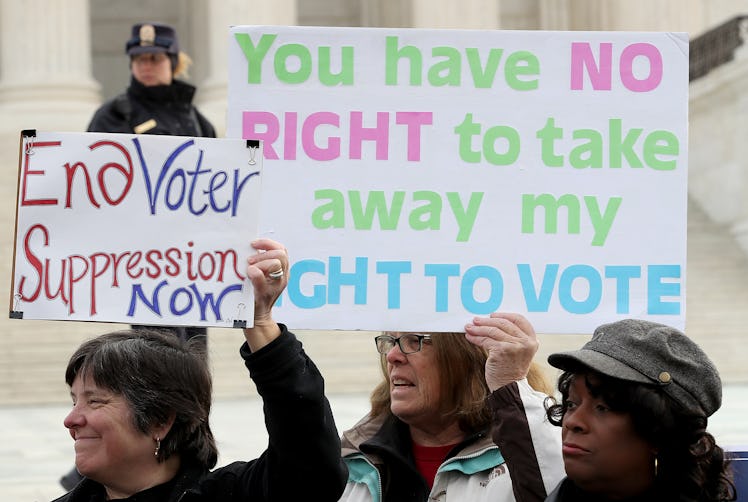
The Supreme Court Upheld A "Use It Or Lose It" Voting Law, So Don't Skip The Polls
Our status as Americans, luckily, gives us the right to vote and help shape how our government looks. Regardless, some of us take it for granted and don't make it out to the polls — which is, too, a right. But a new Supreme Court ruling might just scare you straight to the ballot box. What happens if you don't vote? Well, in at least one state, you might get kicked off the voter rolls, thanks to this new Supreme Court decision.
On Monday, June 11, in a 5-4 decision, the Supreme Court voted to uphold Ohio's "use it or lose it" Supplemental Process, a policy aimed at purging voters who don't show up to elections from the voting rolls. Basically, voters in Ohio who haven't voted in two years are sent a notice through the mail asking them to confirm their voter registration. If they don't respond to the notice and don't vote within the following two years then they are removed from the rolls. Next time they show up to vote — if they show up to vote — they won't be able to cast a ballot until they re-register, according to The Hill. The policy is meant to be a way to identify voters who have moved. In short, people could lose their ability to vote because they failed to turn in a notice, so Ohio will take it as if the person moved.
Critics say that Ohio's law violates The National Voter Registration Act (NVRA), which contains a 1993 failure-to-vote clause that prevents states from purging voters from their rolls just because they haven't voted. However, Justice Samuel Alito, who led the five conservative justices on the bench who were in favor of the policy, said that under the law, the failure to vote isn't the reason someone has been removed from the rolls — but rather, the failure to return the confirmation notice. Ohio's policy “treats the failure to return a notice and the failure to vote as evidence that a registrant has moved, not as a ground for removal," Alito wrote in the majority decision.
The decision only applies to Ohio, but this Supreme Court ruling opens it up for other states to adopt. In fact, Ohio Secretary of State John Husted, wants the victory to be "a model for other states to use," according to NPR.
A policy like this could affect voters between the ages of 18-29 because of their low voter turnout. In the 2016 election, about 50% of eligible young voters didn't vote, and that number was roughly the same in the 2012 election as well. So if young people aren't voting, then they could be kicked off the voter rolls.
Alito, however, believed that it won't affect people interested in voting. He wrote in the June 10 ruling,
The notice in question here warns recipients that unless they take the simple and easy step of mailing back the preaddressed, postage prepaid card — or take the equally easy step of updating their information online — their names may be removed from the voting rolls if they do not vote during the next four years. It was Congress’s judgment that a reasonable person with an interest in voting is not likely to ignore notice of this sort.
But critics say that the policy targets minorities, the disabled, and low-income people, groups that have low voter turnout.
Justice Sonia Sotomayor, who wrote a dissent, argued that Ohio's policy goes directly against the purpose of the NVRA, and "has disproportionately affected minority, low-income, disabled, and veteran voters." Sotomayor also pointed out that the policy has already done quite a bit of damage in its time: Since 2012, 10% of voters from African-American-majority neighborhoods in downtown Cincinnati have been removed from voting rolls for inactivity, compared to 4% in a predominantly white suburban neighborhood. She also detailed all the ways that Ohio's Supplemental Process discriminates against these disenfranchised groups. She wrote,
Low voter turnout rates, language-access problems, mail delivery issues, inflexible work schedules, and transportation issues, among other obstacles, make it more difficult for many minority, low-income, disabled, homeless, and veteran voters to cast a ballot or return a notice, rendering them particularly vulnerable to unwarranted removal under the Supplemental Process.
The Democratic National Committee (DNC) even called the ruling "an attack on democracy." In a statement the DNC said that the case was really about Republicans trying to tilt the odds in their favor by "blocking communities of color," according to NPR. The DNC said,
This ruling emboldens Republicans in states across the country in their efforts to remove millions from their rolls simply for not voting. Make no mistake: this case was about nothing more than Ohio Republicans trying to tilt elections in their favor by blocking communities of color from the ballot box — all under the guise of preventing 'voter fraud.'
The right to vote is one of the most basic rights we have as American citizens, so to take that away seems kind of wrong to me. But for now, if you live in Ohio, check your mail — and no matter where you live, vote.